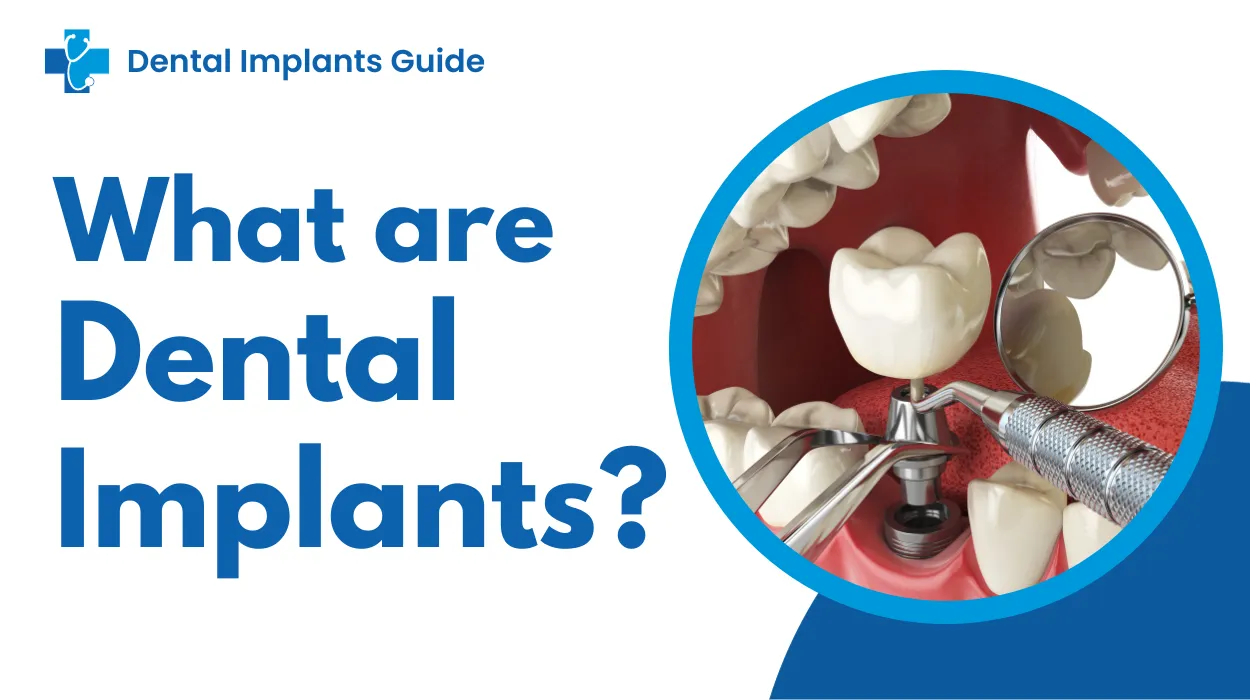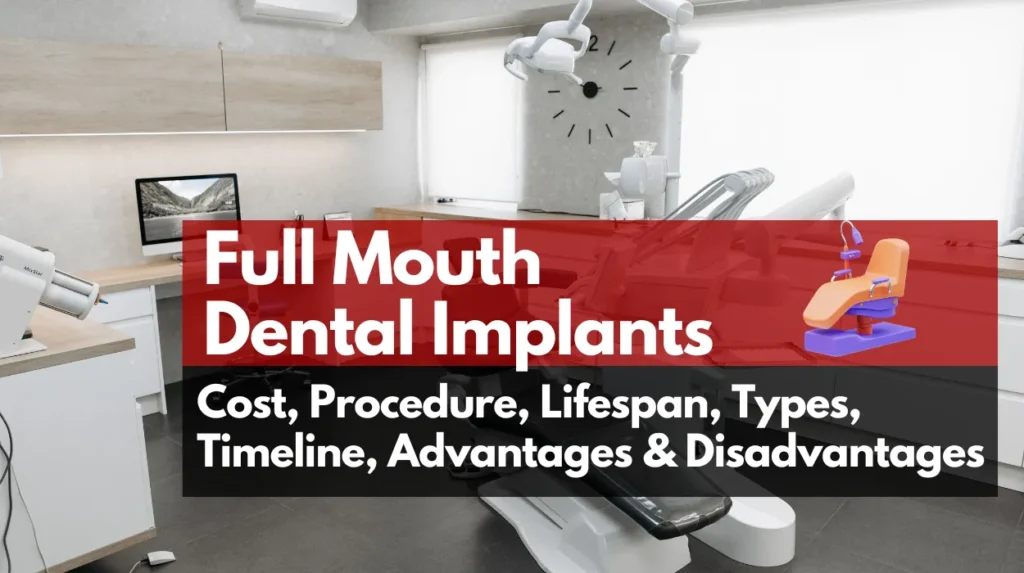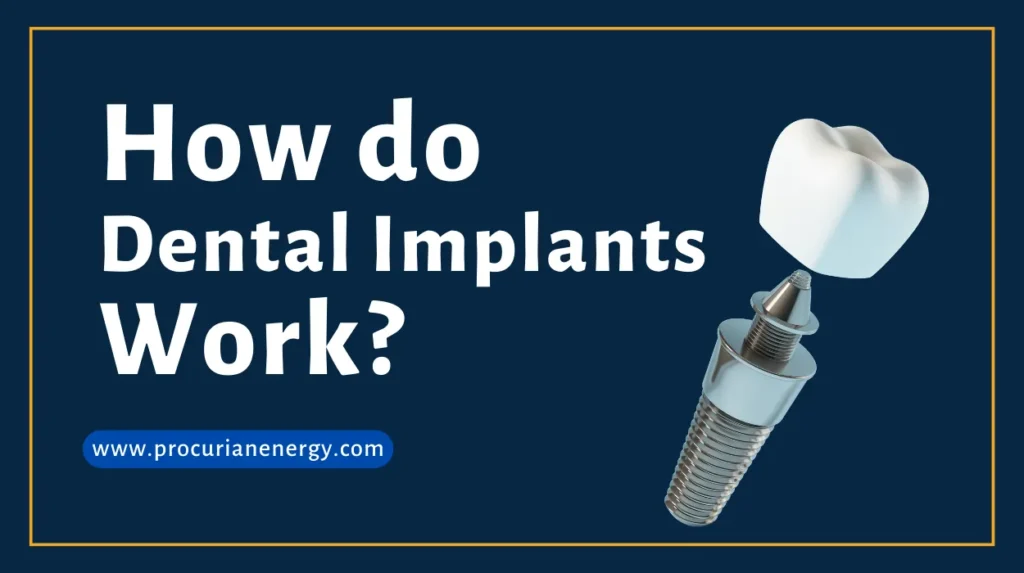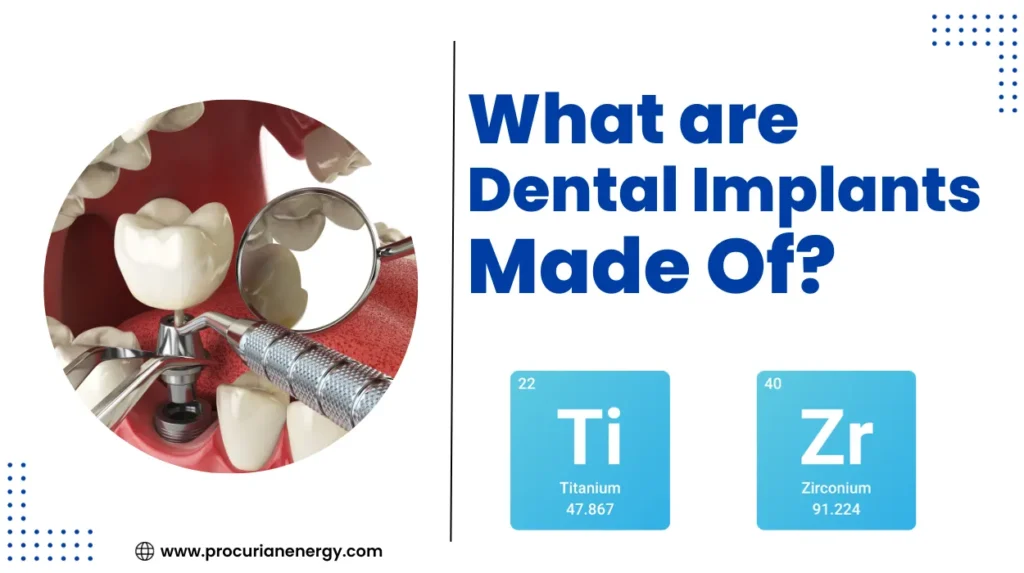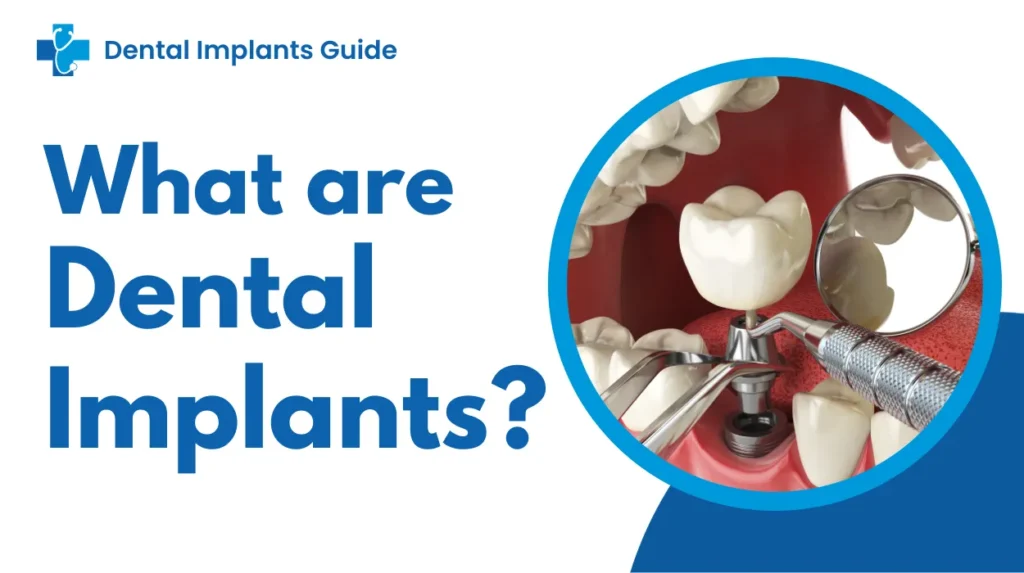
Dental implants have become a popular choice for people who want to restore their smiles and improve their oral health.
In this article, we’ll cover everything you need to know, from what dental implants are to their types, costs, the process, potential side effects, and more.
What Are Dental Implants?
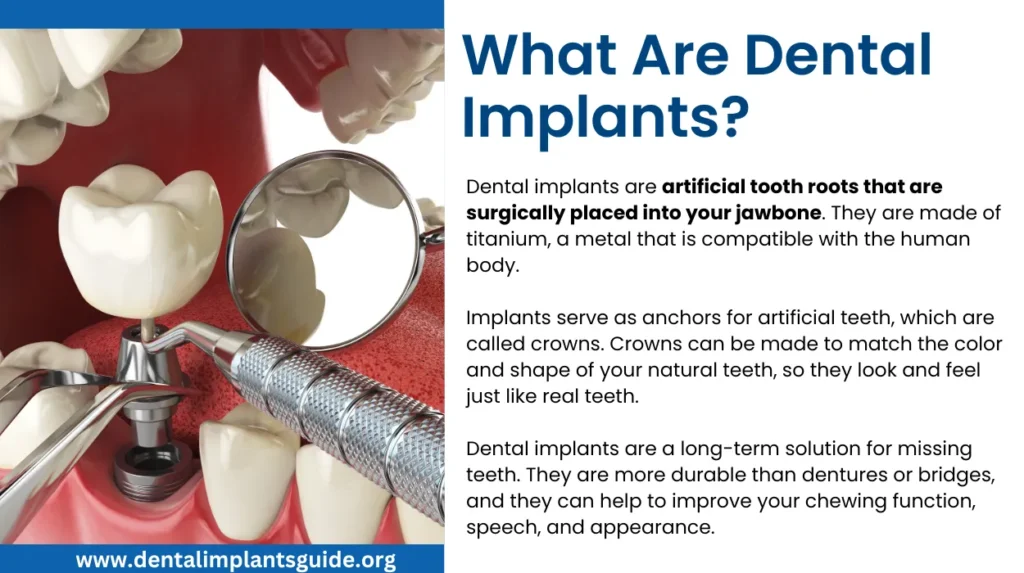
Dental implants are like anchors for replacement teeth. They are tiny, strong metal posts, often made of titanium, that are surgically placed into your jawbone.
Once in place, they act as sturdy foundations for artificial teeth, such as crowns, bridges, or dentures.
Dental Implants are made of titanium, a metal that is compatible with the human body.
Dental implants are a long-term solution for missing teeth. They are more durable than dentures or bridges, and they can help to improve your chewing function, speech, and appearance.
Related Article ➦ What Can I Eat after Dental Implant Surgery?
Are Dental Implants Right for You?
Dental implants can be a fantastic solution for many people, but not everyone is a suitable candidate. You might be a good candidate if:
- You have healthy gums and adequate jawbone density.
- You’re committed to maintaining good oral hygiene.
- You don’t smoke or are willing to quit before the procedure.
- You’re in good overall health.
Types of Dental Implants
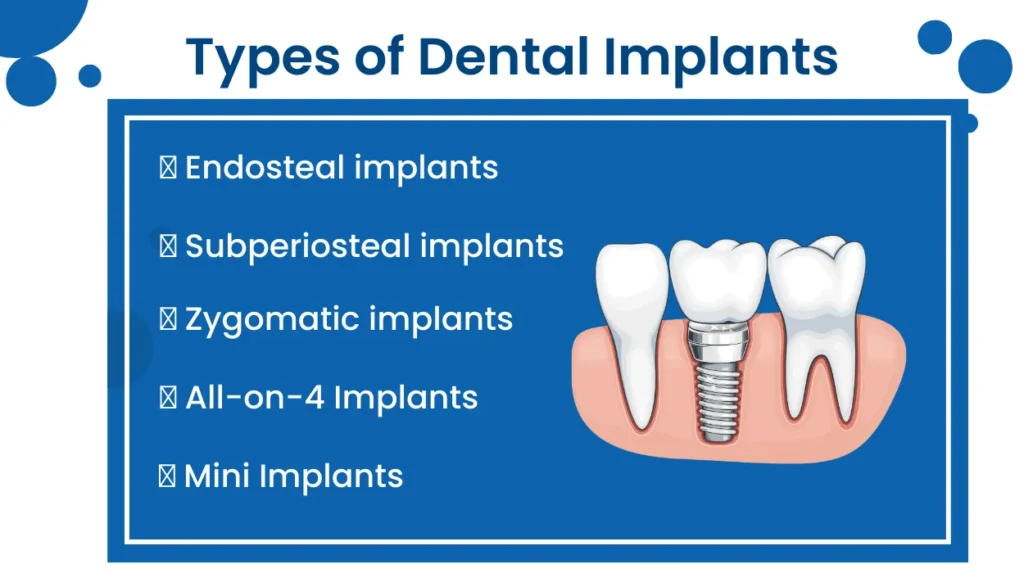
There main types of dental implants are:
⓵ Endosteal implants are the most common type of implant. They are placed in the jawbone and fuse with the bone over time.
⓶ Subperiosteal implants are placed on top of the jawbone, beneath the gums. They are used for people who do not have enough bone for endosteal implants.
⓷ Zygomatic implants are used for people who have lost a significant amount of bone in the upper jaw. They are anchored in the cheekbone.
⓸ All-on-4 Implants is special type of dental implants that allows for a full set of teeth to be supported by just four implants, reducing the number of surgeries required.
⓹ Mini Implants are smaller in size, these implants are often used to secure lower dentures. They require less bone mass than regular implants.
How do dental implants work? (Step-by-step process)
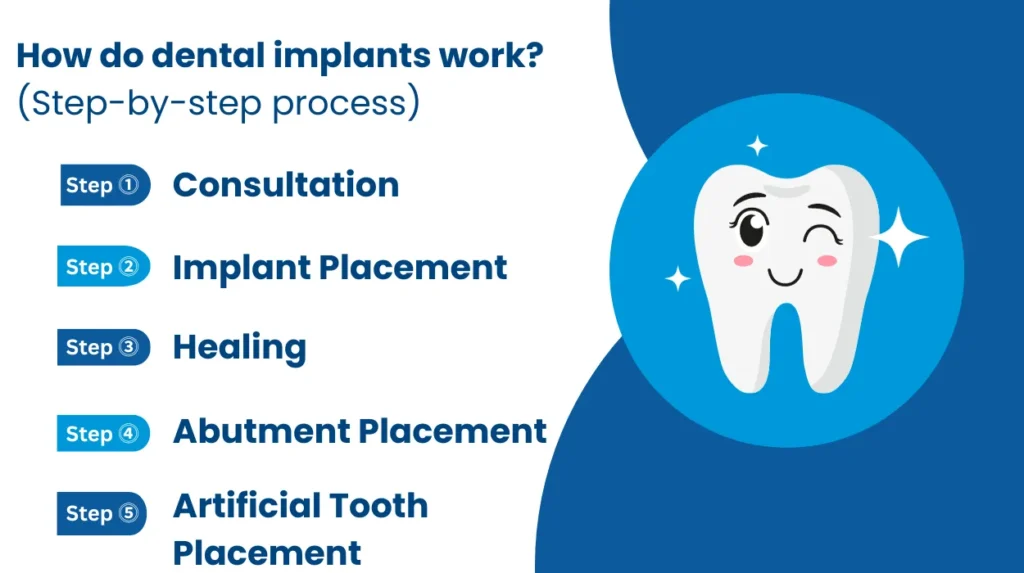
Getting dental implants involves several steps, and it’s not a one-day affair. Here’s a simplified overview of the process:
Step ⓵ Consultation ➔ Your dentist will examine your oral health, take X-rays, and discuss your options. You’ll plan the treatment together.
Step ⓶ Implant Placement ➔ In a minor surgical procedure, the implant is placed into your jawbone. You’ll receive local anesthesia, so you won’t feel any pain.
Step ⓷ Healing ➔ After placement, your jawbone needs time to fuse with the implant, a process called osseointegration. This can take several months.
Step ⓸ Abutment Placement ➔ Once the implant is stable, an abutment (a connector) is attached to it. This will hold your new tooth.
Step ⓹ Artificial Tooth Placement ➔ Finally, your custom-made artificial tooth (crown, bridge, or denture) is attached to the abutment.
Cost of Dental Implants
The cost of dental implants varies according to:
- the type of implant,
- the number of implants required, and
- the location.
On average, a single dental implant procedure costs from $3,000 – $6,000.
Related Article ➦ Do Dental Implants Feel Natural?
Here is an estimate of the dental implant costs for each step of the procedure:
| Procedure | Average Cost (USD) |
|---|---|
| Single Dental Implant | $1,000 – $3,000 |
| Abutment | $300 – $500 |
| Crown | $1,000 – $3,000 |
| Bridge | $1,500 – $4,500 |
| Dentures (full set) | $2,000 – $5,000 |
Risks and Side Effects
Like any medical procedure, dental implants come with potential risks and side effects, although they are relatively rare. Here are some to be aware of:
- Risk of infection at the implant site, but it can usually be treated with antibiotics.
- In rare cases, nearby nerves may be affected, causing numbness or tingling.
- Sometimes, the implant may not fuse properly with the jawbone and may need to be removed.
- Upper jaw implants can irritate the sinus cavities, causing sinus problems.
Pros and Cons of Dental Implants
| Pros of Dental Implants | Cons of Dental Implants |
|---|---|
| ⑴ Natural Look and Feel | ⑴ Costly Investment |
| ⑵ Improved Speech | ⑵ Surgical Procedure |
| ⑶ Easier Eating | ⑶ Healing Time Required |
| ⑷ Durability and Longevity | ⑷ Potential for Infection |
| ⑸ Preservation of Jawbone | ⑸ Risk of Nerve Damage (Rare) |
| ⑹ Enhanced Self-Confidence | ⑹ Possibility of Implant Failure (Rare) |
| ⑺ Customized to Fit You | ⑺ Sinus Issues (Upper Jaw Implants) |
| ⑻ No Impact on Adjacent Teeth | ⑻ Potential for Discomfort After Surgery |
| ⑼ High Success Rate | ⑼ Requires Ongoing Maintenance |
| ⑽ Restores Bite Function | ⑽ Not Suitable for Everyone |
How long does dental implants last?
Dental implants can last a really long time, often for your whole life. They’re super durable and don’t wear out like some other dental treatments.
But, just like your natural teeth, how long dental implants last also depends on how well you take care of them.
So, brush, floss, and see your dentist regularly to keep those implants going strong.
When can you not get dental implants?
You might not be able to get dental implants if you have unhealthy gums, not enough jawbone, or if you’re not willing to commit to good oral hygiene. Smoking can also affect your eligibility.
What to avoid with dental implants?
When you have dental implants, it’s essential to avoid some things to keep them healthy.
- Steer clear of hard foods that can damage your implants.
- Smoking can also be harmful, so quitting is a good idea.
- Don’t forget to brush and floss regularly to prevent plaque buildup.
- Skip using a hard-bristle brush to avoid scratching your implants.
- Don’t skip your dental check-ups;
What is the best age for dental implants?
The best age for dental implants is when your jawbone has fully developed and stopped growing. This is usually around age 18 for girls and age 20 for boys.
How painful are dental implants?
Getting dental implants can be uncomfortable, but it’s not usually super painful.
During the procedure, you won’t feel anything because they numb the area with medicine. Afterward, you might have some soreness, but it’s like an ache, not intense pain. Plus, your dentist can give you pain medicine to help.
So, while it’s not pain-free, it’s usually manageable, and the long-term benefits are often worth it.
Related Article ➦ 8 Common Dental Implants Problems with Solution
How successful are dental implants?
Dental implants are very successful. Studies have shown that the success rate of dental implants is between 90% and 95%. This means that between 9 out of 10 and 95 out of 100 dental implants are successful.
What is the failure rate of dental implants?
The failure rate of dental implants is quite low, around 2% to 5%. This means that most of the time, dental implants work well and last a long time.
A dental implant can fail for a few reasons. Sometimes, it’s because of infections or not taking care of it properly. Other times, it might not fuse well with the jawbone.
Important FAQs
What are dental implants?
Dental implants are like anchors for new teeth, placed in your jawbone.
Do dental implants look natural?
Yes, they look and feel just like your real teeth.
Is the dental implant process painful?
No, you’ll have anesthesia, so you won’t feel pain during the procedure.
Can I eat normally with dental implants?
Yes, you can eat all your favorite foods without any problems.
Do dental implants require special care?
Just regular brushing, flossing, and dental check-ups are enough.
Are dental implants expensive?
They can be costly, but they offer many benefits.
Can anyone get dental implants?
Not everyone, but if you’re healthy and have enough jawbone, you might be a candidate.
How long does the dental implant process take?
It can take 5 to 7 months, including healing time.
Is dental implant surgery safe?
Yes, it’s generally considered safe with a high success rate.
Can smokers get dental implants?
Smokers can get dental implants, but quitting is better for success.
What if I have gum disease?
Treating gum disease before implants is essential for success.
What’s the difference between dental implants and dentures?
Dental implants are fixed in your mouth, while dentures can be removed.
Can I get dental implants for just one tooth?
Yes, you can get a single implant for a missing tooth.
Final Thoughts
Dental implants are a remarkable solution for restoring your smile and oral health. They may not be the cheapest option, but their benefits are well worth it for many people.
If you’re considering dental implants, consult with a trusted dentist to discuss your options and create a personalized treatment plan.
Remember, a healthy smile is a valuable asset, and dental implants can help you regain it. So, don’t hesitate to take the next step towards a brighter, more confident you!
